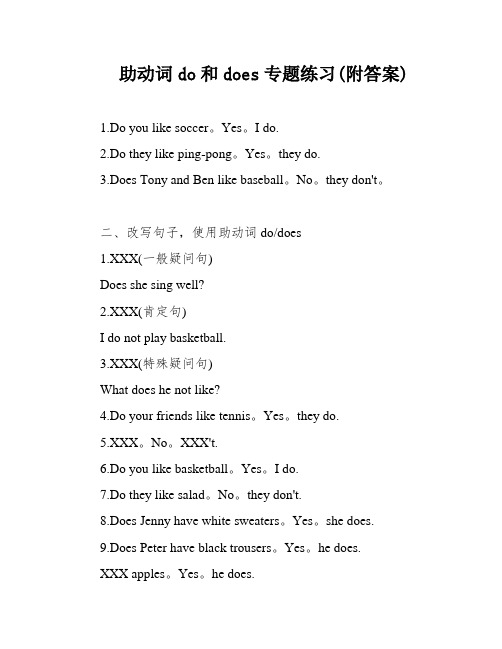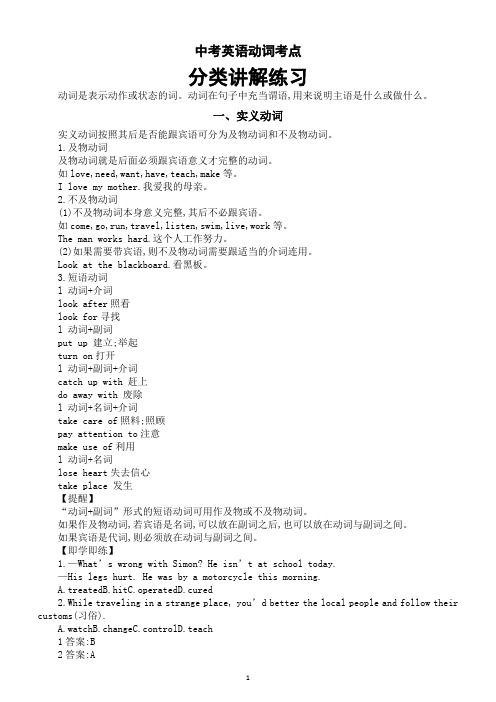(完整版)初中助动词综合分析(全,含练习和答案)
助动词do和does专题练习(附答案)

助动词do和does专题练习(附答案)1.Do you like soccer。
Yes。
I do.2.Do they like ping-pong。
Yes。
they do.3.Does Tony and Ben like baseball。
No。
they don't。
二、改写句子,使用助动词do/does1.XXX(一般疑问句)Does she sing well?2.XXX(肯定句)I do not play basketball.3.XXX(特殊疑问句)What does he not like?4.Do your friends like tennis。
Yes。
they do.5.XXX。
No。
XXX't.6.Do you like basketball。
Yes。
I do.7.Do they like salad。
No。
they don't.8.Does Jenny have white sweaters。
Yes。
she does.9.Does Peter have black trousers。
Yes。
he does.XXX apples。
Yes。
he does.11.Do your friends like bananas。
No。
they don't.12.Do your XXX breakfast。
Yes。
they do.二.按要求完成句子。
1.Does Jenny have a ping-pong bat?2.Do I like to eat vegetables every day?I don't play sports.You don't like ice-cream.My parents don't want to watch TV.His XXX.XXX't like salad.Does he have a XXX ball。
助动词测试题目及答案解析

助动词测试题目及答案解析一、选择题1. 助动词“be”用于构成进行时态,下列哪个句子中的“be”用法正确?A. She is reading a book.B. He was went to the store.C. They are goes to school.D. We am going to the cinema.答案:A2. 下列哪个句子中的助动词“have”用于构成完成时态?A. I have finished my homework.B. She has go to the meeting.C. They had go to the party.D. He has been to the beach.答案:A3. 助动词“will”用于表示将来时态,下列哪个句子用法正确?A. She will go to the market.B. He will goes to the concert.C. They will be going to the park.D. We will are going to the zoo.答案:A4. 助动词“should”用于表示义务或建议,下列哪个句子用法正确?A. You should go to the doctor.B. They should goes to the library.C. He should be going to the gym.D. We should are going to the party.答案:A5. 助动词“can”用于表示能力,下列哪个句子用法正确?A. She can swim.B. He can to swim.C. They can be swimming.D. We can are swimming.答案:A二、填空题6. 助动词“do”用于构成疑问句或否定句,请在下列句子中填入正确的形式。
- I _______ (do) like chocolate.- They _______ (do not) want to go to the party.答案:do not; do7. 助动词“have”用于构成完成时态,请在下列句子中填入正确的形式。
初中情态动词综合分析(含例题和答案解析)(精华)

情态动词综合分析(全&含例题及答案解析)纵观近几年全国各地中考英语试题中的动词类,总会考到情态动词。
情态动词是一种本身有一定的词义,表示说话人的情绪、态度或与语气的动词,但不能单独作谓语,只能和其他动词原形构成谓语。
无人称和数的变化,情态动词后面跟的动词需用原形,否定式构成是在情态动词后面加“not ”。
个别情态动词有现在式和过去式两种形式,过去式用来表达更加客气,委婉的语气, 时态性不强,可用于过去,现在或将来。
情态动词属非及物动词,故没有被动语态。
后续目录:考点一:can ,may ,must 等情态动词在陈述句中的用法;考点二:含有情态动词的疑问句的回答;考点三:不同情态动词的否定意义也不同;考点四:情态动词的被动语态;情态动词易混点归纳;【情态动词例题解析】;情态动词特点考点一:can ,may ,must 等情态动词在陈述句中的用法:1. can 的用法:(1).表示能力、许可、可能性。
表示能力时一般译为“能、会”,即有种能力,尤其是生来具备的能力,此时may 和must 均不可代替它。
如:She can swim fast, but I can ’t .她能游得很快,但我不能。
I can see with my eyes. 我用眼睛看。
(2).表示许可,常在口语中。
如:You can use my dictionary. 你可以用我的字典。
(3).表示推测,意为“可能”,常用于否定句和疑问句中,此时can ’t 译为“ 不可能”。
如:Can the news be true? 这个消息会是真的吗?—Can it be our teacher?那个人有可能是我们老师吗?—No, it can ’t be our teacher. He is on a visit to the Great Wall.不可能。
咱们老师正在游览长城呢。
【例题】—I think Miss Gao must be in the library. She said she would go there. —No. She __bethere, I have just been there. A.can ’t B.mustn ’t C.needn ’t D.wouldn ’t【解析】根据下文“我刚去过那儿”可知,应为“ 不可能”,can ’t 表示推测[答案] A|精.|品.|可.|编.|辑.|学.|习.|资.|料.*|*|*|*||欢.|迎.|下.|载.2. could 的用法:(1).can 的过去式,意为“ 能、会”,表示过去的能力。
2023年中考英语语法---动词及动词短语专题复习及练习题(含答案)

2023年中考英语语法---动词及动词短语专题复习及练习题(含答案)一、动词的基本框架动词包括实义动词、系动词、助动词和情态动词。
(一)实义动词实义动词是能独立作谓语的动词。
按其句法功能可分为及物动词和不及物动词;按其持续性可分为延续性动词和非延续性动词。
1.及物动词:及物动词本身意义不完整,需要接宾语才能使其意思完整。
(1)动词+宾语I like this book very much.我非常喜欢这本书。
(2)动词+宾语+宾补We call the bird Polly.我们叫这只鸟Polly。
I saw the children play in the park yesterday.昨天我看见孩子们在公园玩。
注意:用省略to的不定式或现在分词作宾补的动词有:have,see,watch,notice,hear等。
(3)动词+间接宾语+直接宾语Please pass me the salt.请把盐递给我。
常见的带双宾语的动词有:give,bring,buy,get,leave,lend,make,offer,pass,teach,tell等。
2.不及物动词不及物动词自身意思完整,不用接宾语。
Horses run fast.马跑得快。
(1)有些动词既可作及物动词又可作不及物动词。
We study English.我们学习英语。
(及物动词)We study hard.我们努力学习。
(不及物动词)(2)有些不及物动词与一些别的词搭配在一起构成动词短语,它的作用相当于一个及物动词。
①动词+介词Listen to the teacher carefully.仔细听老师讲。
此类动词短语后面的宾语无论是名词还是代词,都只能放在介词后面,不能放在动词和介词之间。
②动词+副词+介词Let’s go on with our work!让我们继续我们的工作吧!He gets along well with his classmates.他与他的同学们相处得很好。
初中英语2025届中考动词考点分类讲解练习(实义动词+系动词+助动词+情态动词)

中考英语动词考点分类讲解练习动词是表示动作或状态的词。
动词在句子中充当谓语,用来说明主语是什么或做什么。
一、实义动词实义动词按照其后是否能跟宾语可分为及物动词和不及物动词。
1.及物动词及物动词就是后面必须跟宾语意义才完整的动词。
如love,need,want,have,teach,make等。
I love my mother.我爱我的母亲。
2.不及物动词(1)不及物动词本身意义完整,其后不必跟宾语。
如come,go,run,travel,listen,swim,live,work等。
The man works hard.这个人工作努力。
(2)如果需要带宾语,则不及物动词需要跟适当的介词连用。
Look at the blackboard.看黑板。
3.短语动词l 动词+介词look after照看look for寻找l 动词+副词put up 建立;举起turn on打开l 动词+副词+介词catch up with 赶上do away with 废除l 动词+名词+介词take care of照料;照顾pay attention to注意make use of利用l 动词+名词lose heart失去信心take place 发生【提醒】“动词+副词”形式的短语动词可用作及物或不及物动词。
如果作及物动词,若宾语是名词,可以放在副词之后,也可以放在动词与副词之间。
如果宾语是代词,则必须放在动词与副词之间。
【即学即练】1.—What’s wrong with Simon? He isn’t at school today.—His legs hurt. He was by a motorcycle this morning.A.treatedB.hitC.operatedD.cured2.While traveling in a strange place, you’d better the local people and follow their customs(习俗).A.watchB.changeC.controlD.teach1答案:B2答案:A二、系动词系动词不能单独作谓语,必须与表语一起构成谓语。
第02讲 动词和动词短语(课件)-中考英语一轮复习讲练测(全国通用)_1

夯基·必备基础知识 知识点6 高频动词短语归纳
构成方式
常见短语
give a concert开音乐会,give a tea进行测试,have a
rest休息,have a picnic野餐,have a try试一试,keep a
动词+冠词+名词 record保持纪录,leave a message留言,make a face做
smile微笑;swim游泳
夯基·必备基础知识 知识点3 系动词
分类
常用词
例句
表示主语的状态 、特征和身份等
be(是),look(看起来),seem(似乎) ,feel(感觉),appear(出现),smell( 闻起来),taste(尝起来),sound(听 起来)
He is a good father. 他是一位好父亲。She looks younger than before. 她看起来比以前 年轻。
稿定PPT
注意:用省略to的不定式稿或定PP现T,海在量素分材持词续更作宾补的动词有: s如: 新,上千款模板选择总有一
believe相信;find发现;款适h合e你ar听见,听说;keep保持;
make使得;see看见等。
不能直接跟宾语
He is waiting for you at the gate. 他在门口等着你。
2024
中考一轮复习讲练测
第2讲 动词和动词短语
授课:×××
目录
CONTENTS
01
复习目标
02
网络构建
03
知识梳理 题型归纳
04
真题感悟
内容索引
目录
一
复习目标 掌握目标及备考方向
助动词(单选题)(20题含解析)中考英语专题练习

助动词(单选题)中考英语专题练习(20题含解析)全国通用一、单选题(共20题)1.I ________ my homework yesterday.A.don't do B.didn't do C.didn't D.doesn't do 2.— Does your sister eat very ____ at school? — Yes, she ____.A.good, do B.well, does C.well, is D.good, does 3.They __________ lunch at home every day.A.not B.not have C.don't D.don't have 4.I don't have a Ping-Pong ball, _______ my brother _______.A.but; do B.and; does C.and;do D.but; does 5.—Do you have a pen?—Yes, I ________A.does B.do C.has D.am 6.—________ your sister ________ music?—Yes, she does.A.Is; like B.Does; likes C.Do; like D.Does; like 7.- everyone in your family the Chinese New Year?-Yes,of course.A.Do,like B.Is,like C.Is,likes D.Does,like 8.Paul is crazy about basketball, but he ______ football very often.A.doesn’t play B.isn’t playingC.didn’t play D.won’t play9.Peter_____ his homework after nine o'clock in the evening.A.doesn't do B.does not C.isn't do D.isn't doing 10.----How ________ you spell pen? ----P-E-N, pen.A.is B.am C.do D.are 11.Ann doesn't like oranges, but Nick and Tom________A.like B.does C.do D.likes 12.What they every evening?A.are; do B.do; doC.are; doing D.does; do13.Darning doesn’t ________ his homework after supper. He watches TV.A.does B.do C./ D.doing 14.We _________ to buy any fruit. There’s enough for the party.A.don’t need B.not need C.doesn’t need D.needn’t15.—Where_______she _________ ?—She lives in Beijing.A.does; live in B.does; lives in C.is; lives D.does; live16.—I used to eat a lot of junk food.—________.A.So do I B.Neither do I C.So did I D.Neither did I 17.— ________ you have a soccer ball?—Yes, I ___________.A.Are, am B.Do, do C.Do, am D.Am, do 18.—Where_______she _________ ?—She lives in Beijing.A.does; live in B.does; lives in C.is; lives D.does; live19.- Does he have any paper clips?- No, he__A.does B.isn’t C.don’t D.doesn’t20.-___________ you feel scared when you saw the big snake? -No, I didn’t feel scared at all. A.Do B.Did C.Was D.Were【参考答案】一、单选题(共20题)1.B【详解】句意:昨天我没有做家庭作业。
(完整版)初中助动词综合分析(全,含练习和答案)

协助主要动词构成谓语的词叫助动词(Auxiliary Verb),也叫辅助动词。
被协助的动词称作主要动词(Main Verb)。
助动词用来构成时态和语态。
例如:He does not speak English well.(他英语讲得不好。
)句中的does是助动词,既表示一般现在时,又与not一起构成否定形式。
A dog is running after a cat.(一条狗正在追逐一只猫。
)句中的is 是助动词,和run的现在分词一起构成现在进行时。
Did he have any milk and bread for his breakfast ?(他早餐喝牛奶、吃面包吗?)句中的did是助动词,既表示一般过去时,又和动词have一起构成疑问。
助动词具有语法意义,但没有词汇意义,不可单独作谓语。
它没有对应的汉译。
例如:He doesn't like English. 他不喜欢英语。
(does是助动词,无词义;like是主要动词,有词义)最常用的助动词有:be,have,has,do,does,shall,did,will,should,would 等。
助动词可以协助主要动词构成时态或者语态,也可构成疑问句和否定句,构成否定句时与否定副词not连用。
2. 半助动词:在功能上介于主动词和助动词之间的一类结构,称为半助动词。
常见的半助动词有:be about to,be due to,be going to,be likely to,be meant to,be obliged to,be supposed to,be willing to,have to,seem to,be unable to,be unwilling to等3. 情态助动词:情态助动词包括:will(would), shall(should), can(could), may(might), must, need, dare, ought to, used to, had better情态助动词一般简称为情态动词。
- 1、下载文档前请自行甄别文档内容的完整性,平台不提供额外的编辑、内容补充、找答案等附加服务。
- 2、"仅部分预览"的文档,不可在线预览部分如存在完整性等问题,可反馈申请退款(可完整预览的文档不适用该条件!)。
- 3、如文档侵犯您的权益,请联系客服反馈,我们会尽快为您处理(人工客服工作时间:9:00-18:30)。
协助主要动词构成谓语的词叫助动词(Auxiliary Verb),也叫辅助动词。
被协助的动词称作主要动词(Main Verb)。
助动词用来构成时态和语态。
例如:He does not speak English well.(他英语讲得不好。
)句中的does是助动词,既表示一般现在时,又与not一起构成否定形式。
A dog is running after a cat.(一条狗正在追逐一只猫。
)句中的is 是助动词,和run的现在分词一起构成现在进行时。
Did he have any milk and bread for his breakfast ?(他早餐喝牛奶、吃面包吗?)句中的did是助动词,既表示一般过去时,又和动词have一起构成疑问。
助动词具有语法意义,但没有词汇意义,不可单独作谓语。
它没有对应的汉译。
例如:He doesn't like English. 他不喜欢英语。
(does是助动词,无词义;like是主要动词,有词义)最常用的助动词有:be,have,has,do,does,shall,did,will,should,would 等。
助动词可以协助主要动词构成时态或者语态,也可构成疑问句和否定句,构成否定句时与否定副词not连用。
2. 半助动词:在功能上介于主动词和助动词之间的一类结构,称为半助动词。
常见的半助动词有:be about to,be due to,be going to,be likely to,be meant to,be obliged to,be supposed to,be willing to,have to,seem to,be unable to,be unwilling to等3. 情态助动词:情态助动词包括:will(would), shall(should), can(could), may(might), must, need, dare, ought to, used to, had better情态助动词一般简称为情态动词。
后接动词原形。
情态助动词不受主语的人称和数的限制。
两个情态助动词不能连用。
例:他将能够及时完成此事。
He will can finish it in time. ×He will be able to finish it in time. √b. 表示命令。
例如:You are to explain this. 对此你要做出解释。
He is to come to the office this afternoon. 要他今天下午来办公室。
c. 征求意见。
例如:How am I to answer him? 我该怎样答复他?Who is to go there? 谁该去那儿呢?d. 表示相约、商定。
例如:We are to meet at the school gate at seven tomorrow morning.我们明天早晨7点在校门口集合。
2. 助动词have的用法He has left for London. 他已去了伦敦。
By the end of last month, they had finished half of their work.上月未为止,他们已经完成工作的一半。
I have been studying English for ten years. 我一直在学英语,已达十年之久。
English has been taught in China for many years. 中国教英语已经多年。
3. 助动词do 的用法Do you want to pass the CET? 你想通过大学英语测试吗?Did you study German? 你们学过德语吗?I do not want to be criticized. 我不想挨批评。
He doesn't like to study. 他不想学习。
In the past, many students did not know the importance of English.过去,好多学生不知道英语的重要性。
Don't go there. 不要去那里。
Don't be so absent-minded. 不要这么心不在焉。
说明:构成否定祈使句只用do,不用did和does。
Do come to my birthday party. 一定来参加我的生日宴会。
I did go there. 我确实去那儿了。
I do miss you. 我确实想你。
Never did I hear of such a thing. 我从未听说过这样的事情。
Only when we begin our college life do we realize the importance of English. 进了大学以后,我们才认识到英语的重要性。
说明:引导此类倒装句的副词有never, seldom, rarely, little, only, so, well等。
---- Do you like Beijing? --你喜欢北京吗?---- Yes, I do. --是的,喜欢。
(do用作代动词,代替like Beijing.)He knows how to drive a car, doesn't he? 他知道如何开车,对吧?4. 助动词shall和will的用法shall和will作为助动词可以与动词原形一起构成一般将来时。
表示单纯的将来时,shall用于第一人称,第二人称只用于问句;will 多用于第二、第三人称,口语中will也可用于第一人称。
I shall study harder at English. 我将更加努力地学习英语。
Shall we be back in time? 我们会即使回来吗?He will go to Shanghai. 他要去上海。
Will you be free tomorrow afternoon? 你明天下午有空吗?5. 助动词should, would的用法1)should无词义,只是shall的过去形式,与动词原形构成过去将来时,只用于第一人称,常用于间接引语,表示将,将会。
例如:I telephoned him yesterday to ask what I should do next week. 我昨天给他打电话,问他我下周干什么。
He said he should return, and he did return. 他说过他会回来的,他果然回来了。
She realized that she should have to do most of her farm work before sunshine.她明白她得在日出之前干完大部分农活。
2)would也无词义,是will的过去形式,与动词原形构成过去将来时,常用于间接引语,表示将,将会。
例如:He said he would come. 他说他要来。
I felt confident that everything would be all right. 我确信一切都会好的。
1. 由情态动词can, may,will ,shall等构成的句子:变一般疑问句时把 can, may,will ,shall提到句子的前面,句尾用问号即可.变否定句时直接在can,may,后面加not即可. 例如:肯定句: She can swim.一般疑问句: Can she swim?否定句: She can not swim.画线提问: 对she提问: Who can swim?对swim提问: What can she do?could,might,would,should是can,may,will,shall的过去式,若句子中有以上两词时,变疑问句及否定句方法与(1)相同2. 由行为动词构成的句子:需要加助词do或does.变一般疑问句时把do/does放在句子前面.变否定句时把don't/doesn't放在动词的前面。
要注意观察动词的形式并对号入座。
一般疑问句和否定句的动词三单式都要变回原型。
play-----do plays-----does例如:肯定句: They play football after school. He plays football after school.一般疑问句: Do they play football after school?Does he play football after school?否定句: They don't (do not) play football after school.He doesn't play football after school.划线提问:对they/he提问: Who plays football after school?对play football提问: What do they do after school? What does he do after school?对after school提问: When do they play football? When does he play football?3. 由have, has构成的现在完成时句子:变一般疑问句时把have,has提到句子的前面,句尾用问号即可。
变否定句时直接在have,has后面加not即可。
例如:肯定句:He has read today's newspaper.一般疑问句: Has he read today's newspaper.?否定句: He has not read today's newspaper.画线提问: 对he提问: Who has read today's newspaper?对today's newspaper提问: What has he did?had是have和has的过去式,在构成的过去完成时句子中,变一般疑问句时把had提到到句子的前面,句尾用问号即可。
变否定句时直接在had后面加not即可若have,has,had没有出现在完成时的句子中,则当实义动词对待,请参考实义动词的用法。
·· 1. 由情态动词can, may,will ,shall等构成的句子:·变一般疑问句时把 can, may,will ,shall提到句子的前面,句尾用问号即可.·变否定句时直接在can,may,后面加not即可. 例如:·肯定句: She can swim.·一般疑问句: Can she swim?·否定句: She can not swim.·画线提问: 对she提问: Who can swim?·对swim提问: What can she do?· could,might,would,should是can,may,will,shall的过去式,若句子中有以上两词时,变疑问句及否定句方法与(1)相同。
